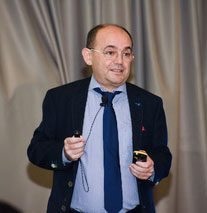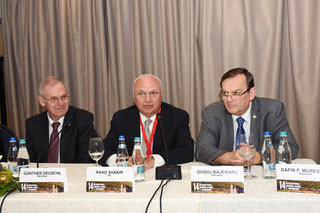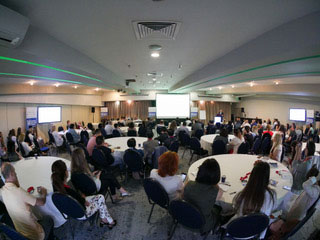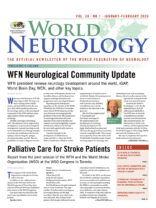By Dafin Muresanu, Selejan Ovidiu, Cristian Andriescu, and Stefan Strilciuc

Prof. Dafin F Muresanu, MD, congress chair, president of the European Federation of Neurorehabilitation Societies (EFNR)
Over the past 15 years, there have been three annual international events in the field of neurology organized by the Society for the Study of Neuroprotection and Neuroplasticity (SSNN). The society was established in 2005 by an international group of clinicians and basic researchers at the initiative of Prof. Dafin F. Muresanu, MD, Romania, with the scope of promoting a strong collaboration platform for translational medicine, in an attempt to strengthen stronger collaboration between the academics and clinicians. Hence, there is dual focus on basic and clinical research. The organization’s aim is to create a discussion forum for better understanding of endogenous basic biological processes, consequently leading to the development of pharmacological and non-pharmacological strategies for positive manipulation of neuroprotection, neuroplasticity, and neurogenesis.
Soon after its establishment, SSNN became a member of the Global College of Neuroprotection and Neuroregeneration (GCNN). The SSNN continues to grow its network, by establishing scientific and academic relations with European and international institutions such as the World Federation of Neurology (WFN), the European Academy of Neurology (EAN), the European Federation of Neurorehabilitation Societies (EFNR), the World Federation of Neurorehabilitation Societies (WFNR), the IuIiu Haţieganu University of Medicine and Pharmacy, Cluj-Napoca, Romania, the Tel Aviv University, Israel, the Danube University Krems, Austria, the Foundation of the Journal Journal of Medicine and Life, and the RoNeuro Institute for Neurological Research and Diagnostic in Cluj-Napoca, Romania.
International Summer School of Neurology
The mission of the International Summer School of Neurology is to provide a platform in which a select class of young neurologists-in-training can interact with an international faculty recognized for its expertise in both basic and clinical neurosciences.

From left to right. Prof.Gunther Deuschl, MD, past president of the EAN, Prof. Raad Shakir, MD, past president of the WFN, and Prof. Ovidiu Bajenaru, MD, past president of the Romanian Society of Neurology
The idea for the event dates back to 2005, being initiated by Muresanu, Prof. Natan Bornstein, MD, Israel, and Prof. Ovidiu Bajenaru, MD, Romania. The founders understood the young specialists’ and practitioners’ need to be connected with the latest developments in the complex field of neurosciences, hence developing a dynamic environment for this symbiosis to take place. After almost a year of preparations, the first edition of the International Summer School of Neurology opened its doors to participants on July 9, 2006. International experts covered current topics like blood-brain barrier research, secondary stroke prevention, the latest advances in neuroimaging and stroke, epilepsy, neurodegenerative disorders, and movement disorders.
Its community reach defines the success of the International Summer School of Neurology. At Poiana Brasov, Romania, 200 participants from eight different countries and 26 illustrious speakers joined together to participate in the 14th Summer School.
In addition to the educational program presented, SSNN also organizes the European Teaching Course on Neurorehabilitation and the EAN Task Force on Rare Neurological Disorders Teaching Course.
European Teaching Course on Neurorehabilitation
One of SSNN’s most prestigious academic projects is the European Teaching Course on Neurorehabilitation. Since its first edition in 2011, the organization joined forces with the educational architect of this program – the European Federation of Neurorehabilitation Societies (EFNR). The teaching course also benefits from the support and endorsement of the international organization in the field of neurorehabilitation, namely the World Federation of Neurorehabilitation Societies (WFNR).

14th International Summer School of Neurology. Presidential Session
The teaching courses’ objectives are (1) to advance the development and improve the quality of neurorehabilitation in Europe; (2) to stimulate the collaboration between clinicians and other disciplines of the neurorehabilitation team; (3) to facilitate the exchange of knowledge and scientific research between clinicians with an interest in neurological rehabilitation, and (4) to contribute to the development of cooperation and communication networks between National Neurorehabilitation Societies. Having these principles in mind, the SSNN and its collaborators have developed a comprehensive and up-to-date teaching course which addresses the pressing needs that reside in the field of neurorehabilitation year by year.
Neurorehabilitation societies are not the only stakeholders that actively contribute to the development of the teaching course. Many other international academic institutions have pledged support and active contribution, including the Foundation of the Journal of Medicine and Life; IuIiu Haţieganu University of Medicine and Pharmacy, Cluj-Napoca, Romania; Tel Aviv University, Israel; Danube University Krems, Austria; and the RoNeuro Institute for Neurological Research and Diagnostic, Cluj-Napoca, Romania. In 2017, the EAN endorsed the European Neurorehabilitation Teaching Course.
This year, the European Teaching Course on Neurorehabilitation reached its 9th edition. The event set the stage for two days of intensive talks and debates between 150 participants from seven countries, on a broad range of challenges in neurorehabilitation and neuroscience, promoting the integration of new scientific information via keynote lectures. A rich and diverse audience of health care professionals interested in this steadily expanding and multidisciplinary field attended the event, including physicians, nurses, therapists, public health experts, and clinical researchers.
EAN Task Force on Rare Neurological Diseases Teaching Course
The most recent educational project proposed by the EAN Task Force on Rare Neurological Diseases (EAN TF RND) to the international scientific community is developed together with the SSNN. From a neuroepidemiological perspective, rare diseases have significant public health impact due to their collective large number and diversity. The task of providing care for over 5,000 documented diseases that are considered to be rare worldwide is a daunting experience. While significant progress has been made in recent years with understanding and mapping rare diseases, providing early diagnosis and valid treatment options for patients with such afflictions is still a great challenge.
Rare neurologic diseases (RNDs) are vastly underdiagnosed and effective treatment is often lacking. The EAN Scientific Committee has established the task force intending to help patients with RNDs and their families, through strategies to facilitate earlier diagnosis, timely management and coordinating research. The Task Force members are experienced scientists, experts in the complex field of rare neurological diseases, who work together to raise awareness and improve knowledge, aiming for earlier diagnosis and specific research programs to identify disease mechanisms and lead to possible therapies.
The Task Force and the SSNN have developed a teaching course aimed to address all the open issues presented. The first edition of this event was hosted by Iuliu Hatieganu University of Medicine and Pharmacy, Cluj-Napoca in 2017. Around 170 physicians, nurses, therapists, public health experts, clinical researchers, and students attended the educational event, along with 12 speakers, experts in the field of RNDs. The meeting in 2019 was the third edition of the EAN Task Force for Rare Neurological Diseases Teaching Course. Through the two-day teaching course, a wide range of topics on rare neurological diseases were approached, such as a detailed overview of rare neurologic disorders in the context of the most studied rare causes of stroke, dominant and episodic ataxias, oligodendrocyte dysfunction, neurometabolic genetic diseases, mitochondrial encephaloneuromyopathies, rare diseases and their relationship with the neurodegenerative diseases, dystonias, transthyretin amyloidosis neuropathy, Huntington’s disease, and many others.
SSNN continues to develop a wide range of activities and educational projects in collaboration with its international multidisciplinary partners to achieve our vision to meet ever-demanding patient needs and to bridge the gap between science and education in the medical community.
For details about the events organized by SSNN, please follow this link. •
Department of Neurosciences, IuIiu Haţieganu University of Medicine and Pharmacy, Cluj Napoca, Romania.
